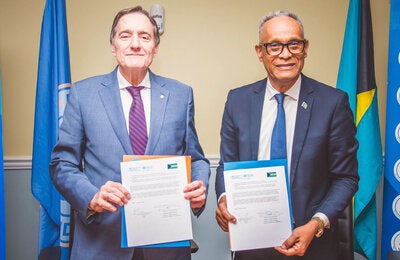

Latin America and the Caribbean have higher levels of antiretroviral treatment (ART) coverage than any other developing region, with 50 percent of people who need treatment receiving it, according to data from 2009.
Santo Domingo, Dominican Republic, 9 November 2011 (PAHO/WHO) — Latin America and the Caribbean have higher levels of antiretroviral treatment (ART) coverage than any other developing region, with 50 percent of people who need treatment receiving it, according to data from 2009. Nevertheless, achieving the goal of universal coverage faces serious obstacles that will require stepped-up action by governments, health systems, and international partners, experts say.
Obstacles to universal HIV treatment and how to overcome them will be the focus of a meeting in Santo Domingo this week organized by the Pan American Health Organization/World Health Organization (PAHO/WHO), UNAIDS and other UN agencies in collaboration with the Global Fund to Fight AIDS, Tuberculosis and Malaria.
"Ensuring universal access to prevention, diagnosis, care and treatment for HIV is a public health priority in our Region," said PAHO Director Dr. Mirta Roses. "Access to treatment is not just a matter of human rights; it reduces the risk of transmission and strengthens prevention."
An estimated 950,000 people in Latin America and the Caribbean need treatment for HIV, but only 478,000 receive it, according to a 2010 progress report by WHO, UNICEF and UNAIDS. In recent years, 40,000 people on average have begun antiretroviral treatment each year, while some 120,000 new HIV infections are reported annually. Ensuring universal access to treatment would require doubling the number of people receiving it through improvements in diagnosis and care, experts say.
People with HIV are considered in need of treatment when they have reduced levels of a type of cell known as CD4, which protects the body against infections and tumors. HIV uses CD4 cells to gain entry into the immune system and leads to a progressive reduction in the number of these cells. WHO recommends that people with HIV begin treatment when their CD4 cell count drops below 350 per cubic millimeter of blood or when they have symptoms of disease.
One of the problems facing Latin America and the Caribbean has been shortages of HIV medications. A 2011 PAHO/WHO survey of 12 countries found that two-thirds had experienced so-called "stock-outs." This required changing or suspending treatment regimens, increasing the risk of HIV resistance and eventual treatment failure.
Experts say shortages result from several factors, including fragmented health systems, lack of integration of HIV treatment into national pharmaceutical supply systems, inefficient procurement systems, and difficulties with storage and distribution of antiretrovirals, which have increased as treatment regimens have become more complex.
Another obstacle to universal treatment is the high cost of HIV medications. In Latin America and the Caribbean, 70 percent of funds spent on HIV go to treatment, and half that amount is spent on antiretrovirals. The prices paid for antiretrovirals vary from country to country, with some paying as much as six times what others pay.
"The costs of first-line antiretrovirals have declined significantly in recent years. However, demand for other high-cost medications to cover the needs of people who have developed resistance has also increased," said Jeffrey O'Malley, director of the HIV Unit of the United Nations Development Program (UNDP). He added, "Access to needed treatment is a matter of human rights."
At the High-Level United Nations Meeting on HIV/AIDS in 2011, representatives of Latin American and Caribbean governments established concrete goals to provide HIV treatment for all those who need it by 2015.
"Bold goals give us the opportunity to strengthen joint efforts by governments, civil society, and cooperation agencies," said Dr. César Núñez, regional director for Latin America of UNAIDS.
On November 9—11 in Santo Domingo, experts from PAHO/WHO, the Global Fund and UNAIDS will meet with the heads of HIV programs and managers of pharmaceutical supply systems from 16 countries, as well as with representatives of other UN agencies and civil society, to develop proposals for increasing access to HIV treatment through:
- Optimal selection of antiretroviral therapy regimens.
- Use of flexibilities in the area of patents to increase access to affordable medicines
- Simplification of treatment regimens within the framework of Treatment 2.0, a WHO-UNAIDS initiative
- Monitoring and prevention of, and rapid response to, stock-outs of antiretroviral medications.
PAHO was established in 1902 and is the world's oldest public health organization. It works with all the countries of the Americas to improve the health and quality of life of the Region's peoples. PAHO is a member of the United Nations system and serves as the Regional Office for the Americas of the World Health Organization (WHO).
Links:
- Antiretroviral therapy (PAHO/WHO)
- Progress Report 2010: Toward Universal Access: Scaling up Priority HIV/AIDS Interventions in the Health Sector, published by WHO, UNAIDS, and UNICEF
- PAHO Strategic Fund
- HIV treatment (UNAIDS)
Contacts:
Leticia Linn, linnl@paho.org, Tel. + 202 974 3440, Móbile +1 202 701 4005 or Donna Eberwine-Villagran, eberwind@paho.org, Tel. +1 202 974 3122, Mobile +1 202 316 5469, Knowledge Management and Communication, OPS/OMS — www.paho.org



